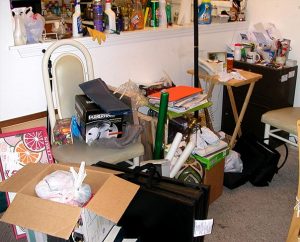“Behind the Chaos: Compulsive Hoarding” is the topic of a free webinar scheduled for 1 p.m. Central Time Oct. 22. Sponsored by LCMS Health Ministry, the webinar was originally set for Sept. 15, but was rescheduled because of technical difficulties.

“Behind the Chaos” is open to anyone who is interested, but may be of particular value to parish nurses and pastors who, “as they do home visits in their congregations, come across this — probably more frequently than we know,” said Tracy Quaethem, project coordinator for LCMS Life and Health Ministries. And, even though hoarding has been portrayed “as something comedic or something for entertainment,” Quaethem acknowledged, “in reality, it’s very serious and can have very serious health consequences.”
Leading the webinar discussion will be Gloria Bersani, director of My Solutions, a community-based program of Lutheran Life Communities, Arlington Heights, Ill., which provides senior housing for independent, assisted living, and long- and short-term care.
Bersani defines hoarding as “the excessive collection and retention of things or animals until they interfere with day-to-day functions such as home, health, family, work and social life.
“Severe hoarding causes safety, financial and health hazards,” she says, and becomes “an immediate danger” when hoarders “can no longer perform daily functions of eating, sleeping, toileting and navigating safely” within their environments.
Hoarding is a mental-health issue and considered a public-health problem, according to Bersani, and afflictions commonly associated with hoarding include dementia, psychosis (paranoid and bi-polar disorders), obsessive-compulsive disorder, depression and alcoholism.
“Hoarding is an acceptable medical condition and requires a collaborative effort with the individual, their family and professionals to reach the goal to identify and manage the stressors that cause and create the behavior,” she told Reporter.
Next month’s webinar will address the definition, causes and myths of hoarding, “especially recognizing it as a disease that is not curable, but with treatment can be manageable,” Bersani said. It will explain the difference between hoarding and clutter, and help identify behaviors that put the hoarder and others at risk.
The webinar also will offer steps church workers and others can take to identify and approach suspected hoarders, as well as how to create a team of professionals that can help them manage this disorder.
Although the webinar is free, those who wish to participate must register by Oct. 20. For more information or to register, contact Tracy Quaethem at tracy.quaethem@lcms.org or 314-996-1711.



